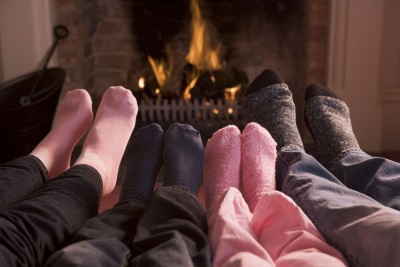12 Cold Weather Maintenance Tips For Your Home
We certainly have had our share of winter this year. Here are a few cold weather maintenance tips to make you warm and cozy!
 1. Allow Your Faucets To Drip
1. Allow Your Faucets To Drip
This sounds counter intuitive, but if the temperatures are well below freezing outside, your pipes are at risk of bursting. Fixing exploded pipes is a costly and pain-staking procedure, so you'll want to avoid that at all costs. If the temperature drops well below freezing, simply crack your faucets to allow water to steadily drip out. The running water in the pipes will keep your pipes from freezing.
2. Leave Your House Immediately If You Detect The Smell Of Gas
If you use gas to heat your home and smell a strong sulfur-like odor, you need to leave your house and call a professional. Gas leaks do happen and they need to be taken seriously and handled by a professional.
3. Turn Down The Thermostat
Or even better, purchase a programmable one. You can save as much as 2-3% on your energy costs for every degree you lower your thermostat around the clock. If you program the heat to lower while your gone at work or sleeping, you can save as much as 10% on your annual heating bill. That sounds pretty nice!
4. Give Your Furnace A Good Inspection
Look for rust. Check for scaling on the heat exchanger. Ensure proper flame color. Also, listen for odd sounds, and note any odd smells. Lastly, check the condition of venting. If you have any cause for concern, consult a professional.
5. Clean Or Replace Your Furnace Filters
Not only does this help you save on heating costs in the long run, but it's a safety thing as well.
6. Check All Windows For Drafts
Use caulking to seal in anywhere that might be drafty.
7. Examine Windows And Doors For Ice Accumulation
If you find any, make a note to replace or repair in the springtime.
8. Check Your Attic For Frost
If there is excessive frost or staining on the underside of the roof, you'll want to see to that in the spring.
9. Clear Exhaust Vents Around The Outside Of Your House
As snow falls, make sure outside vents are clear from snow cover. Covered vents can force dangerous carbon monoxide back into the house.
10. Ensure Your CO2 And Smoke Detectors Are Working
Cold weather shows a jump in carbon monoxide calls for the fire department. Make sure that all of your detectors are working. Carbon monoxide is odorless and colorless, so you'll need a detector to tell if you have a leak.
11. Close Fireplace Dampers When Not Using The Fireplace
If you leave dampers open, it will pull warm air from you house, even if there is no fire. NO sense in paying to heat the outside.
12. Make Sure The Heat Is Actually Getting To You
Vacuum out radiators, baseboard heaters, and furnace duct openings. Also, ensure they are free of obstructions. If you're paying for the heat , you might as well feel it.
Information courtesy of Chester County PA Real Estate Expert Scott Darling.




